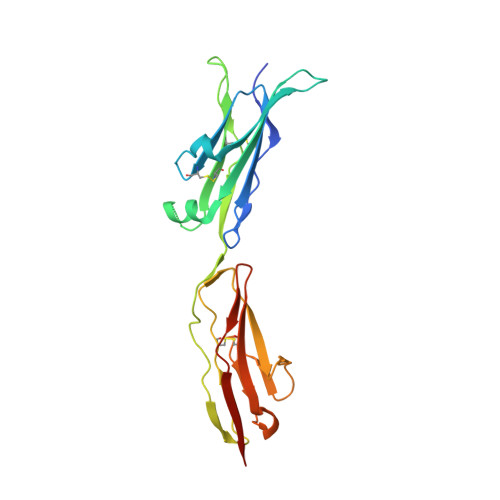Structural insights into the formation of repulsive netrin guidance complexes.
Priest, J.M., Nichols, E.L., Smock, R.G., Hopkins, J.B., Mendoza, J.L., Meijers, R., Shen, K., Ozkan, E.(2024) Sci Adv 10: eadj8083-eadj8083
- PubMed: 38363837
- DOI: https://doi.org/10.1126/sciadv.adj8083
- Primary Citation of Related Structures:
8EDC, 8EDI, 8EDK - PubMed Abstract:
Netrins dictate attractive and repulsive responses during axon growth and cell migration, where the presence of the receptor Uncoordinated-5 (UNC-5) on target cells results in repulsion. Here, we showed that UNC-5 is a heparin-binding protein, determined its structure bound to a heparin fragment, and could modulate UNC-5-heparin affinity using a directed evolution platform or structure-based rational design. We demonstrated that UNC-5 and UNC-6/netrin form a large, stable, and rigid complex in the presence of heparin, and heparin and UNC-5 exclude the attractive UNC-40/DCC receptor from binding to UNC-6/netrin to a large extent. Caenorhabditis elegans with a heparin-binding-deficient UNC-5 fail to establish proper gonad morphology due to abrogated cell migration, which relies on repulsive UNC-5 signaling in response to UNC-6. Combining UNC-5 mutations targeting heparin and UNC-6/netrin contacts results in complete cell migration and axon guidance defects. Our findings establish repulsive netrin responses to be mediated through a glycosaminoglycan-regulated macromolecular complex.
Organizational Affiliation:
Department of Biochemistry and Molecular Biology, University of Chicago, Chicago, IL 60637, USA.
















